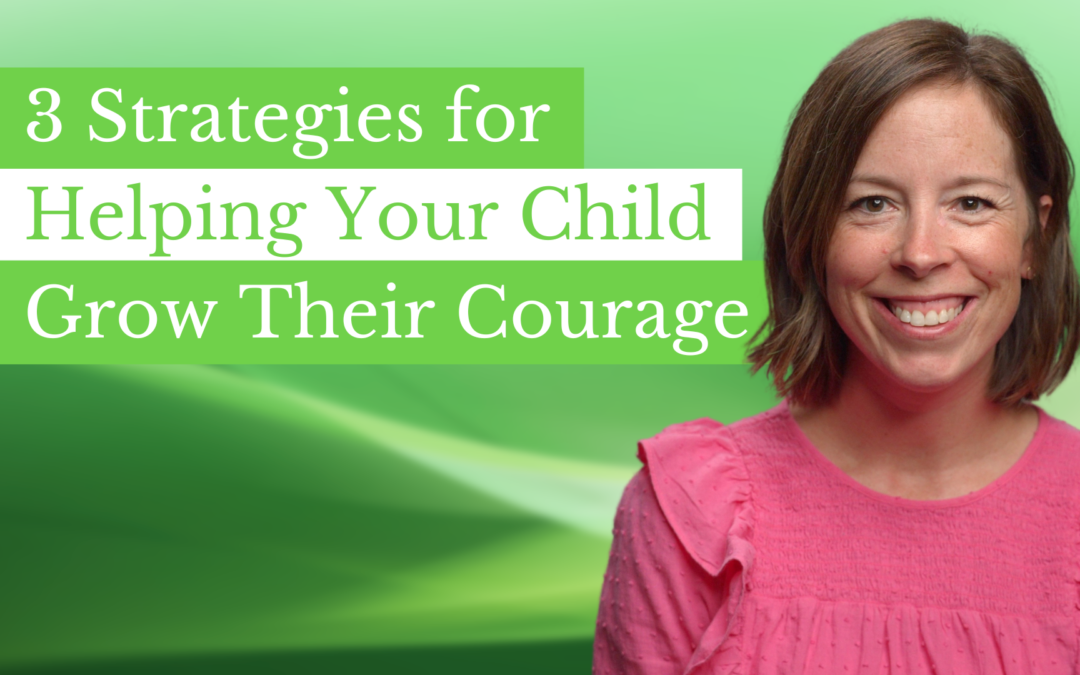Is your child hesitant to try new things, or do they seem overwhelmed by challenges? Does this reluctance present itself even in instances where the new thing is something your child is really wanting to do, like go to a friend’s house for a party or join a new activity?
Building courage is a vital skill for children to learn. It helps them build resilience, self-confidence, and allows them to experience the joy of trying new things.
As a parent, you play an important role giving your child opportunities to grow their courage. But when your child isn’t a natural risk taker, this life skill can be met with resistance.
I’m Courtney Johns, a Licensed Clinical Social Worker at Kid Matters Counseling, and in this article, we’ll explore three effective strategies to help your child grow their courage.
First, Cultivate a Growth Mindset
A growth mindset is the belief that abilities and intelligence can be developed through dedication and hard work. This mindset can really be helpful because it allows your child to focus their energy on things they can control like effort and persistence.
By encouraging a growth mindset, you teach your child that challenges are opportunities for growth, not obstacles.
This can look like, praising effort over outcome. Instead of focusing on the result, acknowledge your child’s hard work and determination. For instance, if your child is learning a new skill, like rollerblading, when they get those rollerblades on, at first you notice their stance is wobbly, they are very slow moving.
Soon enough, your child starts to gain some speed, and as they are starting to pick up momentum, they wipe out and scrape their knee.
The growth mindset message you provide to your child at that moment might be, “I am so proud of you for working so hard. I can see you are trying to balance and you are starting to pick up some speed. That takes work and courage. You are doing it! Way to go!”
It’s important to embrace mistakes by helping your child understand that setbacks are necessary learning experiences and help us grow and get better.
Second, Model Courageous Behavior
Children learn by observing the adults around them. By demonstrating courage in your own life, you inspire your child to do the same.
Take risks and be vocal about your experience. Maybe you try something new like signing up for a race and you are feeling unsure about it. Talk with your child about the feelings you experience and the ways you manage the discomfort.
Sharing details of these moments can normalize that trying new things can leave us feeling uncertain and yet those uncertain feelings don’t need to keep us stuck! Show your child that trying new things can be fun and can open up doors to new interests and connections.
Third, Encourage Problem Solving
Teaching your child problem-solving skills empowers them to face challenges with confidence.
When faced with a problem, help them break down the challenge into smaller steps and explore different solutions.
For instance, if your child comes home from school and complains that they don’t know how to do their homework because they didn’t understand the lesson, work with them to problem solve!
Start by helping them recognize cues that indicate they are confused. Have them brainstorm possible ways to address this. Be sure that this step is child-driven.
Naturally, some of their ideas are going to be better than others. That’s ok. You want to empower your child to take ownership of the problem and explore and evaluate solutions that are goal oriented.
Maybe your child tries to pay closer attention during instruction, or maybe they raise their hand and ask questions during class if they become confused.
Perhaps they do neither of those things and instead they meet with the teacher after school to privately discuss their questions. Whatever the solution, involve your child in the problem solving process!
This builds resilience and fosters a sense of accomplishment.
Remember, building courage takes time and patience. Celebrate your child’s small victories and offer consistent support.
And, if you’re concerned about your child’s lack of confidence, consider scheduling an appointment with us today. We can provide valuable guidance and tools to help your child develop coping mechanisms and build resilience.

Courtney Johns
Child & Adolescent Therapist | LCSW
I offer a safe space where your child can learn to navigate their emotions, develop healthier coping strategies, and equip parents with tools to support their child in the home.
New Clients Call: (855) 586-1802
Current Clients: (855) 543-7687
Ask Us Anything!
We help anxious kids and frustrated parents. We serve Hinsdale & the Western Suburbs of Chicago.
Made with ♥︎ in Hinsdale, Illinois for Chicago
Built By Brand Your Practice.
Kid Matters Counseling, P.C. DISCLAIMER: This website and blog are for informational, educational and general discussion purposes only. It is understood that no guarantee or warranty arises from the information provided, discussed or commented upon in this website and blog nor does it constitute legal or other professional advice on any subject matter. Access to this website and blog is voluntary and at the sole risk of the user. If you think that you have a medical emergency (including clinical), call your doctor or 911 immediately. A licensed medical professional should be consulted for diagnosis and treatment of any and all medical conditions. While the information contained within this website and blog is periodically updated, no guarantee is given that the information provided is correct, complete, and/or up-to-date. See our complete Privacy Policy and Terms of Service.





